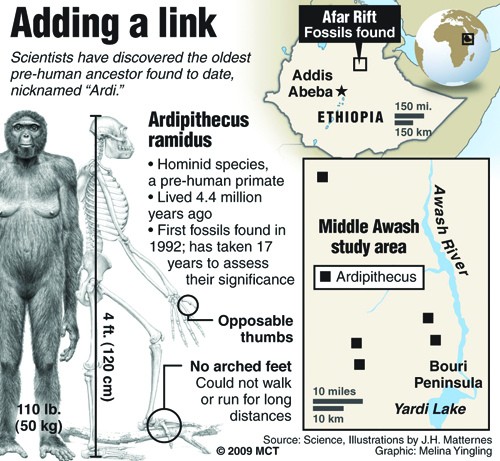‘Ardi,’ the 4.4 million-year-old skeleton recently found in Ethiopia, will completely change the story of early humans, UA anthropologists said.
The fossil has been assigned to the genus Ardipithecus ramidus (‘Ardi’ is a nickname), and belonged to a female weighing approximately 110 pounds.
Stephen Zegura, a professor of anthropology at the UA, said Ardi’s importance stems from the amount of skeletal material scientists have to work with. They can now note the differences between Ardipithecus and the chimpanzee.
For the past 30 years, scientists have used the chimpanzee as a model to gauge what early human ancestors looked like: knuckle-walkers, vertical climbers and tree-dwellers. But because of Ardi and her physical makeup, that model has fallen flat on its face.
“”This really does change the evolutionary story of the human-chimpanzee lines,”” Zegura said.
David Raichlen, an assistant professor in the School of Anthropology, said Ardi is one of the most exciting discoveries in recent decades.
“”It offers us a fuzzy picture of what has happened in the evolution of early humans,”” Raichlen said.
Because of Ardi, scientists can now see a shift in the evolution from Ardipithecus to Australopithecine to our genus, Homo, 2.5 million years ago, he said.
“”The most fruitful research is going to come from looking into the three grades of hominids in human evolution,”” said Raichlen. “”Things were not static from seven million years ago through Australopithecines, but actually have major changes going on within the Homo lineage.””
Raichlen, who specializes in biological mechanics, said the shape of Ardi’s pelvis and lower limbs can give insight into the evolution of bipedalism — the ability to walk on two feet — in early human history.
“”From what I’ve seen of the pelvis and in the foot, Ardipithecus could not have walked like us,”” said Raichen. “”The features of Ardi are not chimp-like at all, but she does have the limbs of an ape from much earlier times.””
If Ardipithecus is deemed an upright walker, it could change the theories of how bipedalism occurred, he added.
Scientists said the discovery of Ardi has opened up avenues of research that have never been imagined.
“”We didn’t know anything about Ardipithecus before this,”” Raichlen said. “”This will completely change the field in one way or another — the question is how.””









